
The Federated States of Micronesia are located on the Caroline Islands in the western Pacific Ocean. The history of the modern Federated States of Micronesia is one of settlement by Micronesians; colonization by Spain, Germany, and Japan; United Nations trusteeship under United States-administered Trust Territory of the Pacific Islands; and gradual independence beginning with the ratification of a sovereign constitution in 1979.
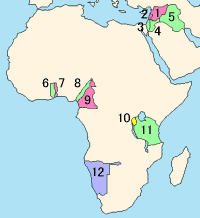
A League of Nations mandate was a legal status for certain territories transferred from the control of one country to another following World War I, or the legal instruments that contained the internationally agreed-upon terms for administering the territory on behalf of the League of Nations. These were of the nature of both a treaty and a constitution, which contained minority rights clauses that provided for the rights of petition and adjudication by the International Court.
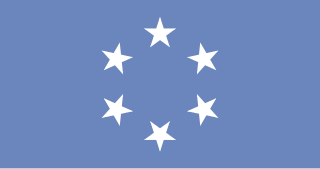
The Trust Territory of the Pacific Islands (TTPI) was a United Nations trust territory in Micronesia administered by the United States from 1947 to 1994.

United Nations trust territories were the successors of the remaining League of Nations mandates, and came into being when the League of Nations ceased to exist in 1946. All of the trust territories were administered through the United Nations Trusteeship Council. The concept is distinct from a territory temporarily and directly governed by the United Nations.
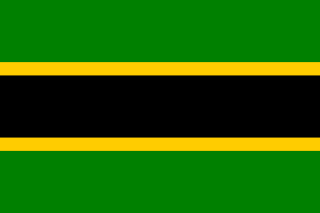
Tanganyika was a sovereign state, comprising the mainland part of present-day Tanzania, that existed from 1961 until 1964. It first gained independence from the United Kingdom on 9 December 1961 as a state headed by Queen Elizabeth II before becoming a republic within the Commonwealth of Nations a year later. After signing the Articles of Union on 22 April 1964 and passing an Act of Union on 25 April, Tanganyika officially joined with the People's Republic of Zanzibar and Pemba to form the United Republic of Tanganyika and Zanzibar on Union Day, 26 April 1964. The new state changed its name to the United Republic of Tanzania within a year.

British Cameroon or British Cameroons was a British Mandate territory in British West Africa. Today, the territory forms parts of Northern Nigeria in West Africa and Cameroon in Central Africa.

British Togoland, officially the Mandate Territory of Togoland and later officially the Trust Territory of Togoland, was a territory in West Africa, under the administration of the United Kingdom. It was effectively formed in 1916 by the splitting of the German protectorate of Togoland into two territories, French Togoland and British Togoland, during the First World War. Initially, it was a League of Nations Class B mandate. In 1922, British Togoland was formally placed under British rule while French Togoland, now Togo, was placed under French rule.
United Nations Security Council Resolution 21, adopted unanimously at the 124th meeting of the Security Council on April 2, 1947, placed the former German Pacific Islands north of the Equator, which were formerly mandated to Japan by the League of Nations, under the Trusteeship System. The Security Council declared 16 Articles under which it had approved the terms. It declared the United States to be the Administering Authority and gave it permission to militarise the territory.

The Trust Territory of Somaliland, officially the "Trust Territory of Somaliland under Italian administration" was a United Nations Trust Territory situated in present-day northeastern, central and southern Somalia. It had as capital Mogadishu and was administered by Italy from 1950 to 1960 as part of the Italian Empire, following the dissolution of the former British Military Administration.
Chapter XII of the United Nations Charter deals with the international trusteeship system. It reaffirms the twin goals mentioned in Chapter XI to "promote the political, economic, social, and educational advancement of the inhabitants of the trust territories, and their progressive development towards self-government or independence". It also provides that the trusteeship system applies to:
Chapter XIII of the United Nations Charter deals with the UN Trusteeship Council. It guarantees each of the five permanent members of the UN Security Council a seat on the council as well as those administering trust countries, and as many other members elected by the UN General Assembly as may be necessary to have an equal number of trust-administering and non-trust-administering countries on the Trusteeship Council. The Trusteeship Council is required to make an annual report to the UNGA on each trust territory. With all territories having reached independence, the Trusteeship Council is basically dormant today. There have been proposals to transform it into a trusteeship council of the global commons, although Kofi Annan recommended abolishing it altogether in his report, In Larger Freedom.
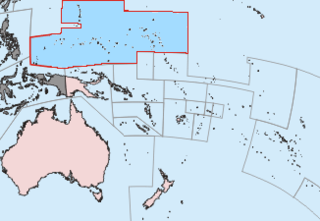
The High Commissioner of the Trust Territory of the Pacific Islands was an official who ruled the American Trust Territory of the Pacific Islands (TTPI), a United Nations trusteeship in the Pacific Ocean under the administration of the United States, between 1947 and 1994. The territory consisted of islands captured by America during World War II, prior to which they had been part of the Empire of Japan as the South Pacific Mandate, within the Japanese colonial empire. After World War II, United Nations Security Council Resolution 21 placed the territory under the United States trusteeship as the Trust Territory of the Pacific Islands. The islands are now part of Palau, Northern Mariana Islands, Federated States of Micronesia, and Marshall Islands.
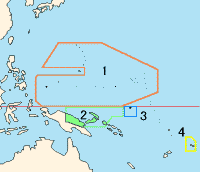
The Governor of the South Pacific Mandate was an official who ruled the South Pacific Mandate, a Class C League of Nations mandate in the Pacific Ocean under the administration of the Empire of Japan, as part of the Japanese colonial empire, between 1922 and 1944. The territory consisted of islands awarded to Japan by the League of Nations after World War I, prior to which they had been part of the German colonial empire. During World War II, the United States captured the islands from Japan. After World War II, the United Nations placed the territory under the United States trusteeship as the Trust Territory of the Pacific Islands. The islands are now part of Palau, Northern Mariana Islands, Federated States of Micronesia, and Marshall Islands.

Dikwa is a town located in Borno State, Nigeria.
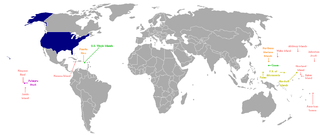
United Nations Security Council resolution 683, adopted on 22 December 1990, after recalling Resolution 21 (1947) which approved the Trusteeship Territory of the Japanese Mandated Islands as well as Chapter XII of the United Nations Charter which established the United Nations Trusteeship system, the Council determined that, in the light of entry into force of new status agreements for Federated States of Micronesia, the Marshall Islands and the Northern Mariana Islands, the objectives of the Trusteeship Agreement had been completed and therefore ended the Trusteeship Agreement with those entities.

United Nations Security Council resolution 956, adopted unanimously on 10 November 1994, after recalling Chapter XII of the United Nations Charter which established the United Nations Trusteeship system and Resolution 21 (1947) which approved the Trusteeship Territory of the Japanese Mandated Islands, the Council determined that, in the light of entry into force of a new status agreement for the Republic of Palau, the objectives of the Trusteeship Agreement had been completed and therefore ended the status of Palau as a Trust Territory.

A referendum on autonomy was held in French Togoland on 28 October 1956. Since World War I the territory had been a League of Nations mandate, then a United Nations Trust Territory under French control. The referendum offered residents the choice of remaining a Trust Territory or becoming an autonomous region within the French Union. The result being 93% in favour of the latter, with a 77.3% turnout. However, the referendum was rejected by the United Nations General Assembly as it had not included the option of independence and opted to continue with the trusteeship. In neighbouring British Togoland, a referendum earlier in the year had resulted in the territory becoming part of Ghana.
The American trusteeship proposal for Palestine, formally known as the United States Proposal for Temporary United Nations Trusteeship for Palestine and announced by President Harry S. Truman on 25 March 1948, was a revised plan from the United States government for the future of the British Mandate for Palestine. The proposal came four months after the approval in the General Assembly of the United Nations Partition Plan for Palestine which had been vigorously supported by the United States, and represented a major shift in policy in response to the ongoing 1947–1948 Civil War in Mandatory Palestine.

The Bevin Plan, also described as the Bevin–Beeley Plan was Britain’s final attempt in the mid-20th century to solve the troubled situation that had developed between Arabs and Jewish people in Mandatory Palestine.
















